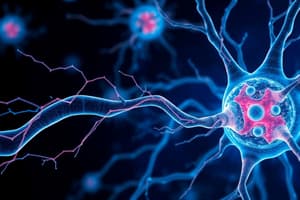Podcast
Questions and Answers
The first step in a signaling pathway that responds to a molecule that stays in the extracellular space is
The first step in a signaling pathway that responds to a molecule that stays in the extracellular space is
What type of cell response would take the longest amount of time (on the scale of minutes to hours) to execute?
What type of cell response would take the longest amount of time (on the scale of minutes to hours) to execute?
Which of the following is NOT an intracellular signaling protein activated by an RTK?
Which of the following is NOT an intracellular signaling protein activated by an RTK?
Steroid hormones trigger transcription of target genes by
Steroid hormones trigger transcription of target genes by
Signup and view all the answers
Which of the following types of cell signaling is long range and uses hormones as signals?
Which of the following types of cell signaling is long range and uses hormones as signals?
Signup and view all the answers
The active form of a monomeric GTP-binding protein is the
The active form of a monomeric GTP-binding protein is the
Signup and view all the answers
Which of the following describes negative feedback regulation?
Which of the following describes negative feedback regulation?
Signup and view all the answers
Enzymes that add a phosphate group to a switch protein are called
Enzymes that add a phosphate group to a switch protein are called
Signup and view all the answers
How does the binding of a signal molecule activate an RTK for downstream signaling?
How does the binding of a signal molecule activate an RTK for downstream signaling?
Signup and view all the answers
Shown below is a diagram of how theoretical intracellular signaling pathways could integrate incoming signals to produce a coordinated cell response.
Shown below is a diagram of how theoretical intracellular signaling pathways could integrate incoming signals to produce a coordinated cell response.
Signup and view all the answers
Study Notes
Cell Signaling Pathways
- The first step in a signaling pathway that responds to a molecule that stays in the extracellular space is the binding of a signal molecule to a receptor on the surface of a target cell.
Intracellular Signaling Proteins
- One of the following is NOT an intracellular signaling protein activated by an RTK (Receptor Tyrosine Kinase): Ras, Raf, MEK, ERK, or PI3K.
Steroid Hormone Signaling
- Steroid hormones trigger transcription of target genes by binding to intracellular receptors, forming a complex that enters the nucleus and regulates gene expression.
G-Proteins
- The active form of a monomeric GTP-binding protein is the GTP-bound form.
Cell Signaling Regulation
- Negative feedback regulation occurs when the response to a signal decreases or terminates the original signal.
Enzymes in Cell Signaling
- Enzymes that add a phosphate group to a switch protein are called kinases.
RTK Activation
- The binding of a signal molecule to an RTK (Receptor Tyrosine Kinase) activates it for downstream signaling by causing the receptor to dimerize and autophosphorylate.
Integrated Cell Response
- Intracellular signaling pathways integrate incoming signals to produce a coordinated cell response, involving the interaction of multiple signaling pathways and the regulation of gene expression.
Studying That Suits You
Use AI to generate personalized quizzes and flashcards to suit your learning preferences.



